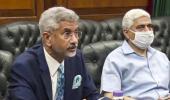After two decades, the SCO appears to be at a cross-roads with the US withdrawal from Afghanistan, asserts Srikanth Kondapalli, the leading China expert.

The 21st summit meeting of the Shanghai Cooperation Organisation meeting at Dushanbe in Tajikistan from September 16-17 is expected to go down in history as one of the most significant gatherings in its two-decade history, given the recent turbulence in the region after the Taliban takeover of Kabul, Iranian membership in the organisation, novel Coronavirus responses, economic development agenda and others.
The SCO has eight members including Russia, China, India, Pakistan, Tajikistan, Uzbekistan, Kazakhstan and Kyrgyzstan, and several observers such as Iran and Afghanistan.
In the last two decades, its institutionalisation process has intensified as with the expansion in membership.
It withstood global financial crisis although many SCO member States are not strictly market economies.
The SCO foundation coincided with 9/11 and the aftermath of the US troops presence in Afghanistan and the overthrow of the Taliban and the killing of Osama bin Laden.
Now, after two decades, the SCO appears to be at a cross-roads with the US withdrawal from Afghanistan.
The regional States and institutions such as the SCO are now forced to fend for themselves about the fallout from Afghan developments.
The Taliban takeover of Kabul is expected to take much of the energies of the SCO meeting.
Its Contact Group on Afghanistan had already deliberated on this issue a few months ago but before the whole of Afghanistan came under Taliban rule.
The uncertainty in Afghanistan, reports of food shortages, alleged killings in different places, protests by women and other groups on implementation of Sharia laws have all underlined the tentative peace and stability that prevails in the region.
Moreover, the Taliban's links to several terror networks in Russia, Central Asia, China and South Asia has led the SCO and others imposing conditions on the new rulers in Kabul to delink from international terrorism.
While the Taliban has made pragmatic gestures, assured several countries that Afghan soil will not be allowed to launch attacks on others and the like, the near future does not seem to be certain on this issue for many SCO member States and others.
The quick visits of security chiefs of Russia, the US and UK to India, the intelligence chiefs meeting in Islamabad, the foreign ministers of countries bordering Afghanistan and other intensive confabulations in the last few days signify to the challenges for regional peace and stability and the tasks ahead for the SCO meeting.
The SCO has a Regional Anti-Terrorist Structure (RATS) in Tashkent and the member States have conducted counter-terrorism exercises in the form of peace mission exercises and others regularly.
However, the onslaught of the Afghan fallout appear to outnumber the work done by the SCO States, specifically the fragile governance structures of several Central Asian states.
While Russia had in the last few months strengthened the capacity of these States to oppose terrorism under the Collective Security Treaty Organisation, China also appears to be nibbling away its influence.
For India, this is the fourth summit meeting participation, albeit virtually in the previous meeting and in hybrid form this year.
India's basic interests in the SCO revolve around counter-terrorism, energy security and strengthening economic ties.
In addition, as with other meetings, India is likely to raise the issue of violation of its sovereignty and territorial integrity due to the Chinese investments in Pakistan occupied Kashmir region.
Moreover, the killing of nine Chinese workers or engineers at Dasu hydroelectricity dam had highlighted the dangers of constructing such projects in sensitive regions.
On the other hand, Indian participation in the North-South Transport Corridor along with Russia, Iran, Central Asian Republics and others are least controversial and this may lead to more consensus building among the SCO States.
Chahbahar port project in Iran that was built with Indian assistance also shines as an example of amicability among all parties.
India is likely to call for intensifying counter-terrorism efforts, strengthen the United Nations Security Council resolutions and arrangements on counter-terrorism and narcotics spread, bind the Taliban to observe their promises to the regional and international community, protect its investments (of $3 billion) in Afghanistan, and other measures.
While India's economic, trade and investment links with the Eurasian region needs more attention in the coming years, at the previous virtual meeting organised by Russia, India had proposed further thrust into innovation and start-ups given the disruptions due to the Covid-19 pandemic.
Hence vaccine diplomacy and infrastructure build-up are likely to be given thrust in this round of the meeting.
Finally, it is likely that India will insist on taking measures for reforming multilateral institutions to better reflect the reality of the 21st century aspirations of the developing countries.
This has been the thrust area in the recently concluded BRICS virtual meeting at New Delhi as well.
Srikanth Kondapalli is Professor in Chinese Studies at Jawaharlal Nehru University.
Feature Presentation: Aslam Hunani/Rediff.com











 © 2025
© 2025